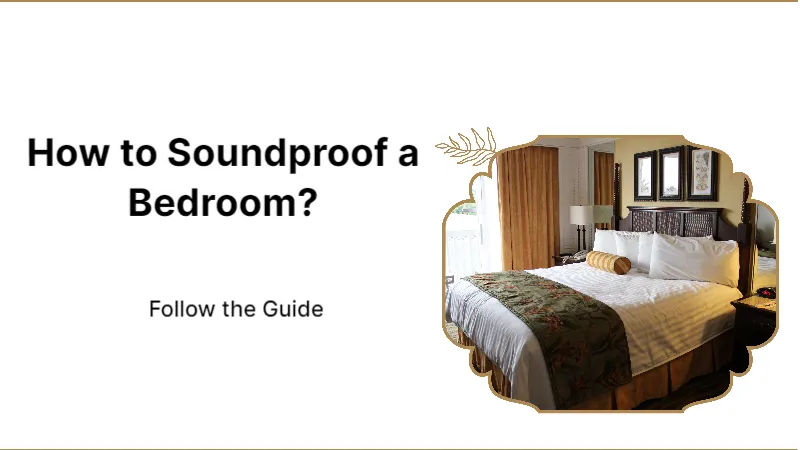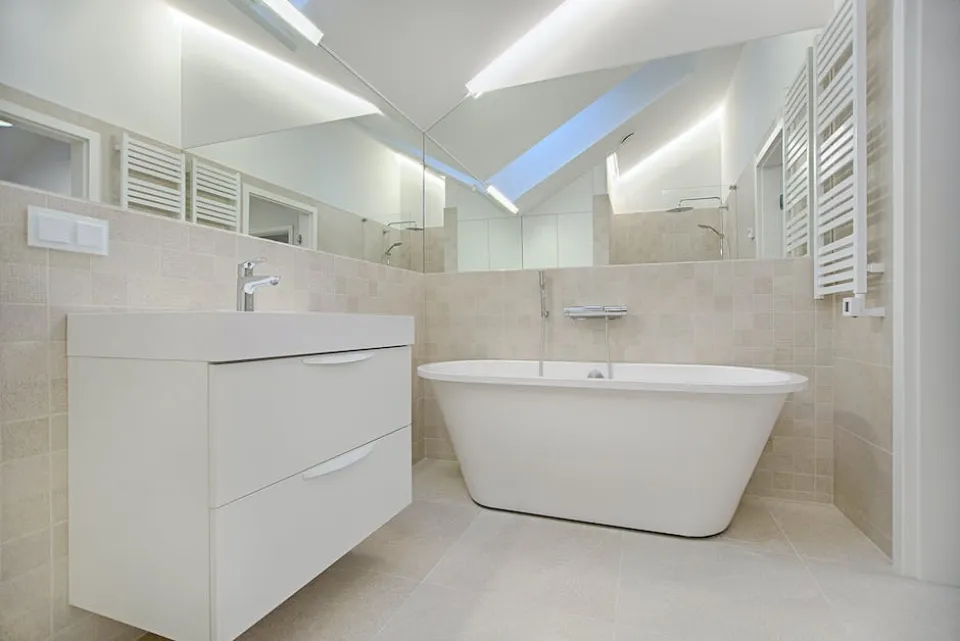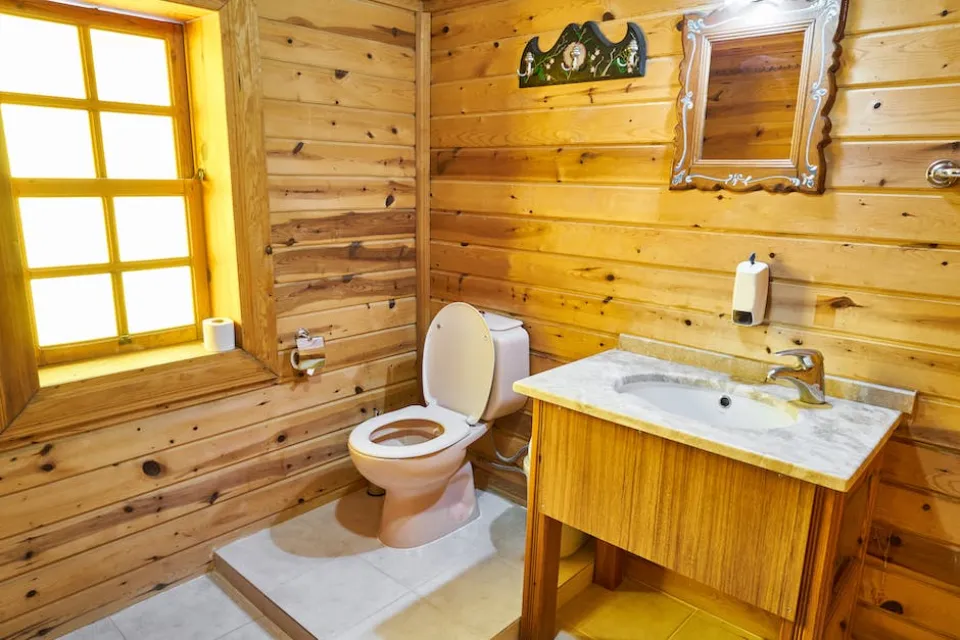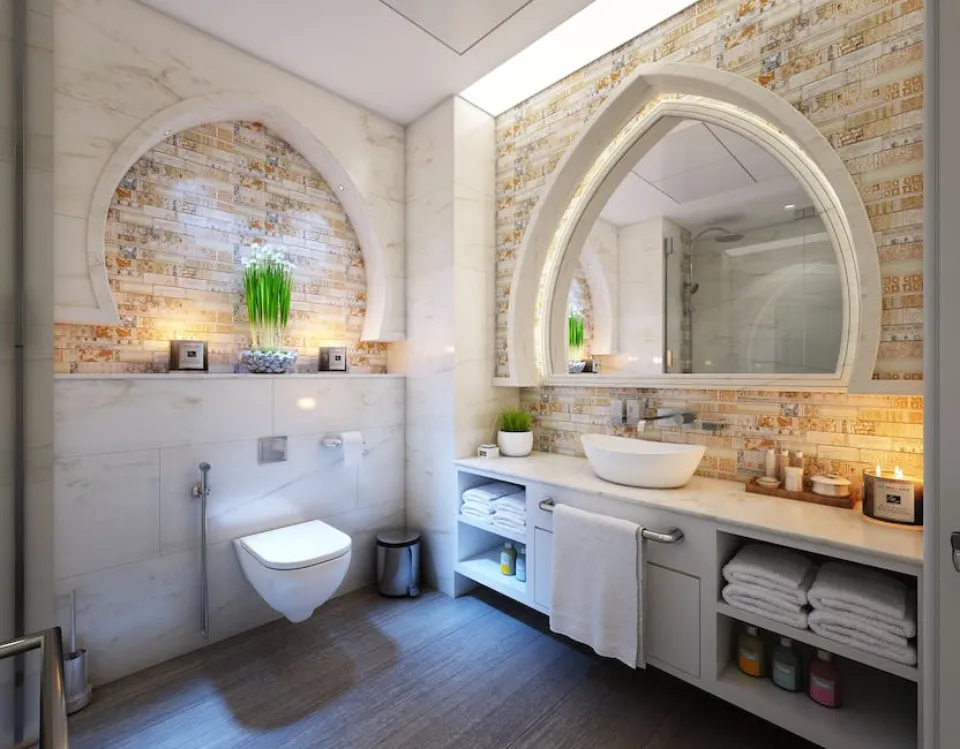Soundproofing can be a problem for all home types, whether you live in a high-rise apartment or a large suburban home. So,how to soundproof a bedroom?
You are supposed to Control Noise From Doors, Reduce Sound Through Floors, Cut Down Ceiling Noise, Stop Outside Noises From Getting Through Your Windows, Install Acoustic Panels, and Upgrade Your Bedroom Door…
What is Soundproofing?
If there is excessive noise around you, soundproofing your house or apartment might be the logical solution. When noise or sound is coming from a specific source, soundproofing is a technique that uses acoustic treatment to reflect, suppress, diffuse, and absorb it. This can be achieved through insulation from various sources or by using double glazed windows to prevent the outside noise from filtering in, to name a few.
Even though it would be nice to have windows in every room of the house, it is occasionally not possible. So, you might be wondering does a bedroom have to have a window and how important it is to have one there.
Methods for Soundproofing Your Bedroom
Use soundproofing materials on the walls, around the doors, and underneath the flooring to insulate your bedroom from outside noise. These are just a few of the numerous strategies you can use to guarantee a peaceful night’s sleep; continue reading to find out more about each one.
Non-Invasive Methods
Are your walls so thin that you can hear every sniffle your neighbors make? Then, to reduce noise production, think about adding mass to your surroundings. For adding industrial-grade material to your walls that provides added mass while blocking out unwelcome noise, our Quiet Barrier HD Soundproofing Composite is perfect. You’ll notice right away the difference soundproofed bedroom walls can make.
To lessen the effect of unwanted sounds, think about hanging rugs and rubber mats from your walls. They will aid you in reducing noise.
Control Noise from Doors

There’s a good chance that good noise is leaking into and out of your room through the gap at the bottom of your bedroom door. If you want to prevent a draft, think about investing in a product. You can install door sweeps or seals at the bottom of your door to close any gaps.
Reduce Sound through Floors
Flooring generates its own assortment of grating noises, from thudding footsteps to shrill squeaks. Whether your floor is wooden or tile-lined, you’ll want to invest in a protective sheet that provides a soundproofing barrier.
Our Impact Barrier QT Flooring Underlayment offers a solution to echoes and other noise-related issues. This specific underlayment is invisible with the highest sound quality control, making it ideal for stone-laying environments as well as tile floors. To lessen the impact of walking noises, you should also think about investing in thicker carpets.
Cut Down Ceiling Noise
The noise could be coming from above, depending on where your bedroom is located. Reducing impact noise, like the pitter-patter of little feet, or airborne noise, like the sound of a TV playing, is beneficial in this situation.
Stop Outside Noises from Getting Through Your Windows
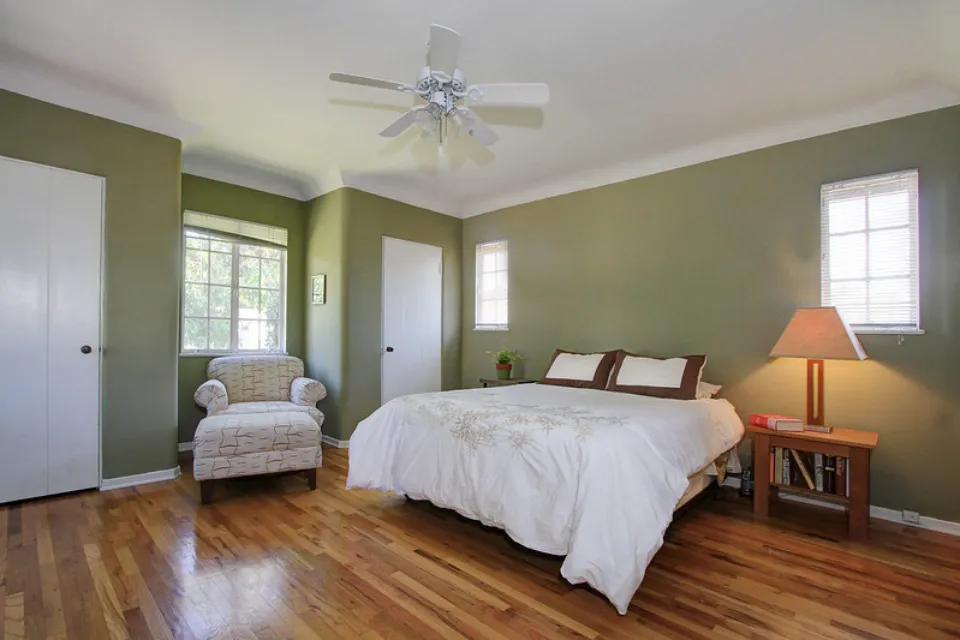
Depending on where you live, outside noises can be very upsetting. This can make your bedroom less than the ideal place to unwind after a long day at work, especially during rush hour.
Honking horns, blaring music from vehicles, outdoor dining establishments and trains are all sources of noise that can get into your bedroom through your windows. When this happens, you might start to wonder how you can soundproof your bedroom in any way possible, but have you thought about your windows?
You can greatly reduce noise in your bedroom by installing double-pane windows. More outside noise will be absorbed by the two glass layers and the narrow space between them. Additionally, they use less energy, which allows you to pay less for heating and cooling.
There are alternative methods to soundproof a window if double-pane windows cannot be installed. Here are some options you may want to consider:
- Use an acoustical sound sealant to close any air gaps in your windows.
- Tape insulation over the window’s bottom and the spot where the sill meets the window.
- To muffle some noise from outside, drape the window with heavy drapes.
Install Acoustic Panels
For serious soundproofers, the answer to your noise troubles may lie in the clouds—specifically, in an acoustic ceiling cloud hung from the ceiling of a room to eliminate echoes and absorb noises.
Upgrade Your Bedroom Door
Bedrooms with hollow-core doors, which have an inner layer of cardboard or plastic and an outer layer of thin wood, are typically noisier than those with solid-wood doors. The soundproofing of a room can be greatly improved by swapping a light interior door for a sturdy solid-wood one. A more substantial door can help block traveling sound, and save you from ever again having to hear your son playing video games until the wee hours.
Hang Soundproofing Curtains
A chic way to soundproof a space? You get a double-benefit when you cover windows with soundproof curtains: a lovely, calming decorative touch and a reliable way to muffle traffic, sirens, and street noise.
Apply Noise-Reducing Wallpaper
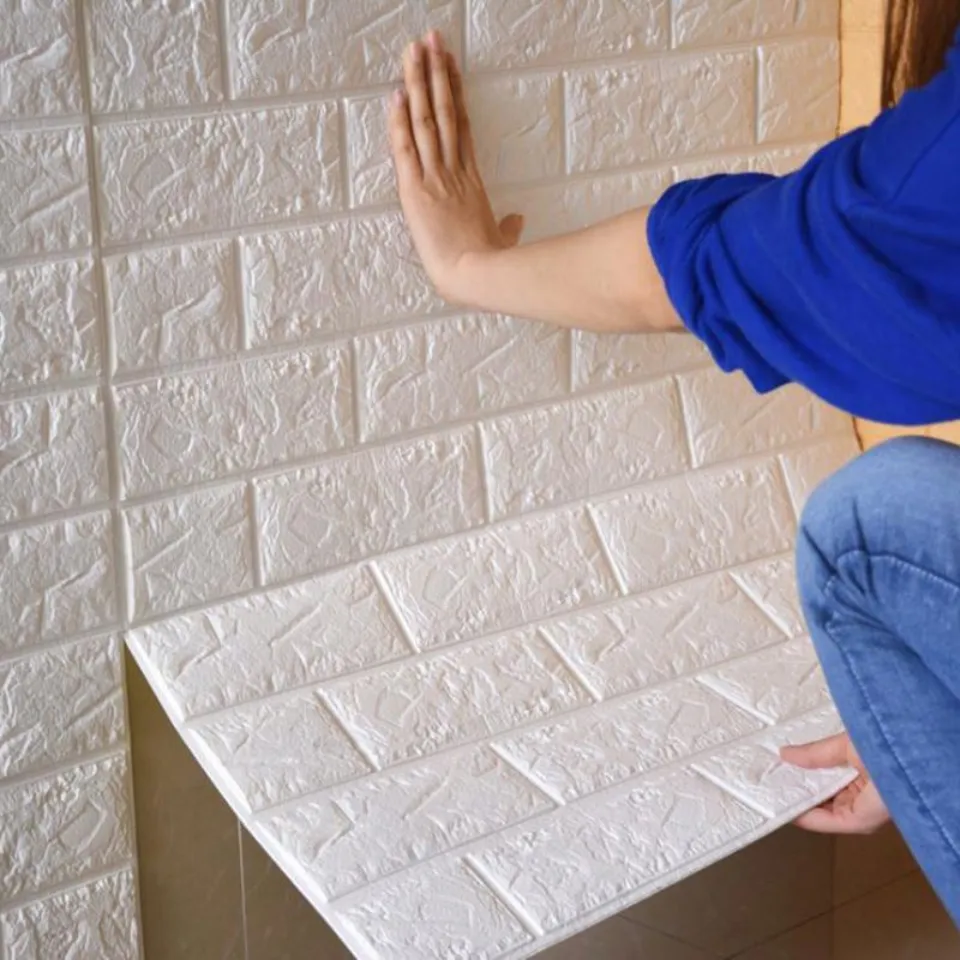
Wallpaper is making a comeback, and this time, it has a little extra to offer. It turns out that some wallpapers can help control noise. A thick layer of polyethylene foam is used to make sound-absorbing wallpaper, such as Arthome’s brick peel-and-stick wallpaper, which muffles noise and vibrations. Wallpaper will probably not completely soundproof walls, of course, but it will make it a little simpler to soundproof an apartment so you don’t hear your neighbor’s next-door neighbor’s buzz-saw snores.
Rearrange the Room
A small budget can be used for soundproofing. In fact, you can take steps to control bedroom noise without buying anything at all. Occasionally, all it takes is rearranging the furniture with the goal of absorbing sound and preventing it from reaching your ears. Moving a large bookcase or dresser to a hallway back wall or an exterior wall can be a useful tactic for noise reduction.
Renovate Your Bedroom for Better Soundproofing
If you want to go above and beyond to achieve better sound deadening for your bedroom, remodeling it will yield some of the best outcomes. The walls can be soundproofed from the inside out as one method of achieving this.
Suggested reading: So, does a bedroom have to have a closet? Below will tell you what makes a bedroom a bedroom. Surprise! The answer to this question is not that simple. In order to share our research with you here, we conducted a little investigation. Keep reading.
Why to Soundproof a Bedroom
The good news is that you can actually manage the noise that enters and leaves your room. With a few soundproofing materials, you can quickly enjoy the peace of silence.
If you’re unsure of how soundproofing could help you, we can assure you there are countless benefits. Whether you love them or hate them, the noise your neighbors decide to produce is beyond your power. You might need to put earplugs in your ears on restless nights because of loud parties or music. You will experience the peace you deserve when you soundproof your bedroom.
By soundproofing your bedroom, you can enjoy your home without drawing unwanted attention to it. Whether you have a passion for loud music or want to practice your guitar in peace, you can enjoy all of your noises at your level of comfort.
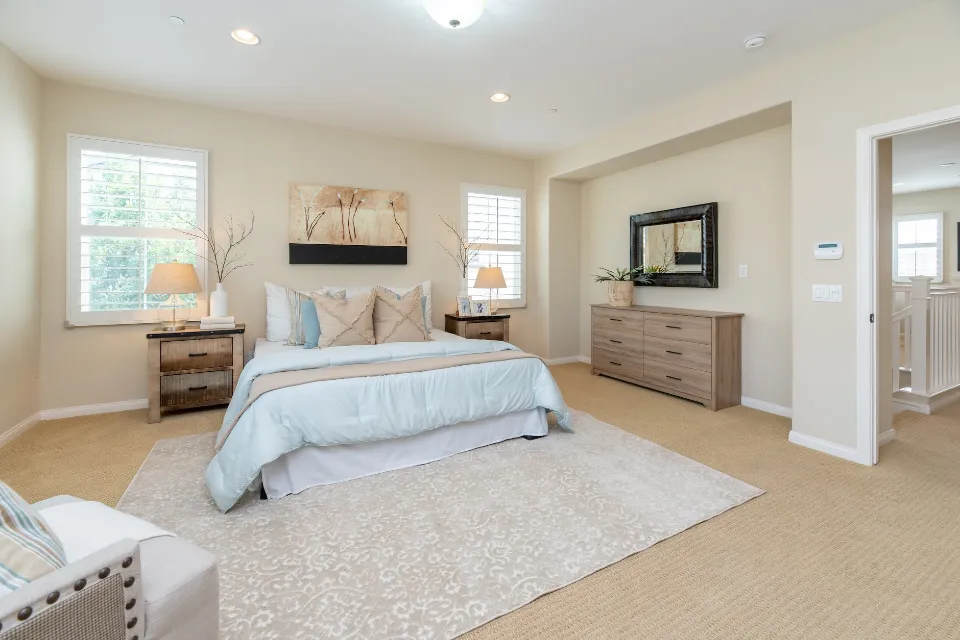
Frequently Asked Questions
Can a Room Be Completely Soundproof?
A room can be completely soundproofed, but you must deal with the sound’s source, entry point, and reflection points.
In order to reduce outside noise, you might use a sound booth, acoustic panels, acoustic foam, curtains, and/or window coverings.
How Do I Stop Outside Noise in My Room?
Use of a sound booth or the installation of acoustic foam and panels on walls are the two best ways to reduce outside noise in a room. To help reduce outside noise, you could also arrange the furniture, rugs, and carpets differently. Another choice is to drape blankets over sound entry points, depending on where the noise is coming from.
Try to identify the sound’s origin, entry points, and reflection points before you begin. You could use window treatments and curtains to block out noise, for instance, if you live near a busy street.
What is the Cheapest Way to Soundproof a Wall?
Using thick blankets and quilts is the most affordable way to soundproof a wall. Depending on where the noise is coming from, place blankets over the walls, doors, or windows to muffle it. To keep the sound in, hang blankets on both sides of the doors or inside walls.
Similar to that, you can soundproof a wall using large furniture like bookcases, cabinets, and other pieces of furniture. Put them up against the wall to muffle noise.
How Can I Soundproof a Room for Free?
You must make use of the items you already have in your home if you want to soundproof a room for no cost. The best options are rugs, curtains, and blankets. You can also rearrange your furniture to dampen sounds.
Start by placing bookshelves and other large pieces of furniture against shared walls. Sofas and chairs with cushions can muffle downstairs noise. Thick wallpaper and blankets may dampen the sound coming from adjacent rooms, while curtains can minimize outside noise.
Read about
Summary: How to Soundproof a Bedroom?
You can’t always control the noise that surrounds your bedroom, especially if it’s coming from the street or your neighbor’s house. But you can lessen it by using these straightforward soundproofing techniques.
You are supposed to Control Noise From Doors, Reduce Sound Through Floors, Cut Down Ceiling Noise, Stop Outside Noises From Getting Through Your Windows, Install Acoustic Panels, and Upgrade Your Bedroom Door…
Thank you for reading.
